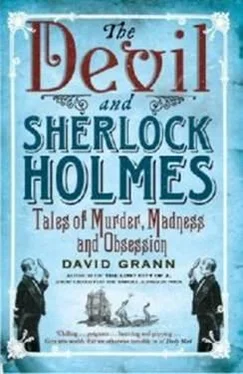Willingham had grown close to some of his prison mates, even though he knew that they were guilty of brutal crimes. In March, 2000, Willingham’s friend Ponchai Wilkerson-a twenty-eight-year-old who had shot and killed a clerk during a jewelry heist-was executed. Afterward, Willingham wrote in his diary that he felt “an emptiness that has not been touched since my children were taken from me.” A year later, another friend who was about to be executed-“one of the few real people I have met here not caught up in the bravado of prison”-asked Willingham to make him a final drawing. “Man, I never thought drawing a simple Rose could be so emotionally hard,” Willingham wrote. “The hard part is knowing that this will be the last thing I can do for him.”
Another inmate, Ernest Ray Willis, had a case that was freakishly similar to Willingham’s. In 1987, Willis had been convicted of setting a fire, in West Texas, that killed two women. Willis told investigators that he had been sleeping on a friend’s living-room couch and woke up to a house full of smoke. He said that he tried to rouse one of the women, who was sleeping in another room, but the flames and smoke drove him back, and he ran out the front door before the house exploded with flames. Witnesses maintained that Willis had acted suspiciously; he moved his car out of the yard, and didn’t show “any emotion,” as one volunteer firefighter put it. Authorities also wondered how Willis could have escaped the house without burning his bare feet. Fire investigators found pour patterns, puddle configurations, and other signs of arson. The authorities could discern no motive for the crime, but concluded that Willis, who had no previous record of violence, was a sociopath-a “demon,” as the prosecutor put it. Willis was charged with capital murder and sentenced to death.
Willis had eventually obtained what Willingham called, enviously, a “bad-ass lawyer.” James Blank, a noted patent attorney in New York, was assigned Willis’s case as part of his firm’s pro-bono work. Convinced that Willis was innocent, Blank devoted more than a dozen years to the case, and his firm spent millions, on fire consultants, private investigators, forensic experts, and the like. Willingham, meanwhile, relied on David Martin, his court-appointed lawyer, and one of Martin’s colleagues to handle his appeals. Willingham often told his parents, “You don’t know what it’s like to have lawyers who won’t even believe you’re innocent.” Like many inmates on death row, Willingham eventually filed a claim of inadequate legal representation. (When I recently asked Martin about his representation of Willingham, he said, “There were no grounds for reversal, and the verdict was absolutely the right one.” He said of the case, “Shit, it’s incredible that anyone’s even thinking about it.”)
Willingham tried to study the law himself, reading books such as “Tact in Court, or How Lawyers Win: Containing Sketches of Cases Won by Skill, Wit, Art, Tact, Courage and Eloquence.” Still, he confessed to a friend, “The law is so complicated it is hard for me to understand.” In 1996, he obtained a new court-appointed lawyer, Walter Reaves, who told me that he was appalled by the quality of Willingham’s defense at trial and on appeal. Reaves prepared for him a state writ of habeas corpus, known as a Great Writ. In the byzantine appeals process of death-penalty cases, which frequently takes more than ten years, the writ is the most critical stage: a prisoner can introduce new evidence detailing such things as perjured testimony, unreliable medical experts, and bogus scientific findings. Yet most indigent inmates, like Willingham, who constitute the bulk of those on death row, lack the resources to track down new witnesses or dig up fresh evidence. They must depend on court-appointed lawyers, many of whom are “unqualified, irresponsible, or overburdened,” as a study by the Texas Defender Service, a nonprofit organization, put it. In 2000, a Dallas Morning News investigation revealed that roughly a quarter of the inmates condemned to death in Texas were represented by court-appointed attorneys who had, at some point in their careers, been “reprimanded, placed on probation, suspended or banned from practicing law by the State Bar.” Although Reaves was more competent, he had few resources to reinvestigate the case, and his writ introduced no new exculpatory evidence: nothing further about Webb, or the reliability of the eyewitness testimony, or the credibility of the medical experts. It focussed primarily on procedural questions, such as whether the trial court erred in its instructions to the jury.
The Texas Court of Criminal Appeals was known for upholding convictions even when overwhelming exculpatory evidence came to light. In 1997, DNA testing proved that sperm collected from a rape victim did not match Roy Criner, who had been sentenced to ninety-nine years for the crime. Two lower courts recommended that the verdict be overturned, but the Court of Criminal Appeals upheld it, arguing that Criner might have worn a condom or might not have ejaculated. Sharon Keller, who is now the presiding judge on the court, stated in a majority opinion, “The new evidence does not establish innocence.” In 2000, George W. Bush pardoned Criner. (Keller was recently charged with judicial misconduct, for refusing to keep open past five o’clock a clerk’s office in order to allow a last-minute petition from a man who was executed later that night.)
On October 31, 1997, the Court of Criminal Appeals denied Willingham’s writ. After Willingham filed another writ of habeas corpus, this time in federal court, he was granted a temporary stay. In a poem, Willingham wrote, “One more chance, one more strike / Another bullet dodged, another date escaped.”
Willingham was entering his final stage of appeals. As his anxieties mounted, he increasingly relied upon Gilbert to investigate his case and for emotional support. “She may never know what a change she brought into my life,” he wrote in his diary. “For the first time in many years she gave me a purpose, something to look forward to.”
As their friendship deepened, he asked her to promise him that she would never disappear without explanation. “I already have that in my life,” he told her.
Together, they pored over clues and testimony. Gilbert says that she would send Reaves leads to follow up, but although he was sympathetic, nothing seemed to come of them. In 2002, a federal court of appeals denied Willingham’s writ without even a hearing. “Now I start the last leg of my journey,” Willingham wrote to Gilbert. “Got to get things in order.”
He appealed to the U.S. Supreme Court, but in December, 2003, he was notified that it had declined to hear his case. He soon received a court order announcing that “the Director of the Department of Criminal Justice at Huntsville, Texas, acting by and through the executioner designated by said Director… is hereby DIRECTED and COMMANDED, at some hour after 6:00 p.m. on the 17th day of February, 2004, at the Department of Criminal Justice in Huntsville, Texas, to carry out this sentence of death by intravenous injection of a substance or substances in a lethal quantity sufficient to cause the death of said Cameron Todd Willingham.”
Willingham wrote a letter to his parents. “Are you sitting down?” he asked, before breaking the news. “I love you both so much,” he said.
His only remaining recourse was to appeal to the governor of Texas, Rick Perry, a Republican, for clemency. The process, considered the last gatekeeper to the executioner, has been called by the U.S. Supreme Court “the ‘fail safe’ in our criminal justice system.”
One day in January, 2004, Dr. Gerald Hurst, an acclaimed scientist and fire investigator, received a file describing all the evidence of arson gathered in Willingham’s case. Gilbert had come across Hurst’s name and, along with one of Willingham’s relatives, had contacted him, seeking his help. After their pleas, Hurst had agreed to look at the case pro bono, and Reaves, Willingham’s lawyer, had sent him the relevant documents, in the hope that there were grounds for clemency.
Читать дальше











